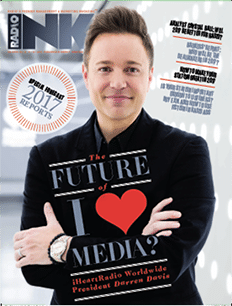
Darren Davis is president of iHeartRadio. His rapid rise through the ranks of radio management is a true blueprint for success — one that includes determination, desire, and hard work. He’s always curious. He’s always ready for his next challenge. He’s always having fun. And now he’s always mentoring as many people as he can along the way, spreading his unbridled enthusiasm for the business he loves.
Davis decided he wanted to be in the radio business when he was 6 years old and was lucky enough to see “behind the curtain” at his hometown radio station, KNCO-AM in Grass Valley, CA. He became a radio groupie, calling the station all the time, until the jocks knew who he was every time he called. He perceived the DJs as “people making really cool stuff come out of my radio speakers.” Davis would wind up working at KNCO when he came home from George Washington University for the summer. He did whatever was asked of him and asked to do anything that needed to be done.
After college, Darren took a position as an intern at WASH-FM in Washington, DC. By age 23 he was the PD at the station. As you’ll read in this cover story, Davis would advance up the radio management ladder every few years, taking on more responsibility, managing more stations, leading more people. At iHeart, Davis would eventually hold the positions of regional VP of programming in Detroit and Chicago, senior VP of programming, and executive VP/GM of national programming.
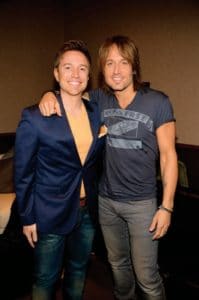
Today, as president of the iHeartMedia Networks group, Davis oversees several important businesses inside iHeartMedia, including Premiere Networks, Total Traffic + Weather Network, NBC News Radio Network, and iHeartMedia’s Global Music Marketing team, Programmatic & Data Operations, in-house commercial creative agency, and in-house graphic design team.
IHeartMedia Chairman/CEO Bob Pittman tells Radio Ink, “Darren is the perfect example of an industry leader: a strong background in broadcast radio, a world-class sense of curiosity about other media and platforms, a willingness to innovate and question constantly, and someone who values and builds strong teams and coaches our future leaders.”
RI: How and why did you get into radio?
Davis: I always wanted to be in the radio business. When I was a kid, my parents owned a small bakery in our hometown, and we used to take doughnuts down to the local radio station DJs sometimes, when I was 6 or 7 years old. And the minute I got to see “behind the curtain” in that studio, I fell in love with how cool radio could be.
I’d call the request line so many times a day to request Sheena Easton songs, the guys could recognize me on the phone pretty quickly, and I was hooked on the whole idea of those people sitting in those tiny studios making really cool stuff come out of my radio speakers. That was KNCO in Grass Valley, CA. It’s an AM/FM combo up in the mountains between Sacramento and Tahoe. Back then, it was just an AM.
RI: And eventually you wound up working at KNCO?
Davis: Yes, KNCO was my first experience getting to work in radio. Even before I started at WASH-FM in 1992. I went home for the summer after my freshman year at GW and got a job for three months at KNCO. I worked five or six days a week all summer, doing anything they’d let me do — writing news copy every morning for the anchors, getting interview audio carted up — and I got to actually anchor the 8:30 morning newscast every day on the FM Country station.
Then I ran the board during The Rush Limbaugh Show on the AM side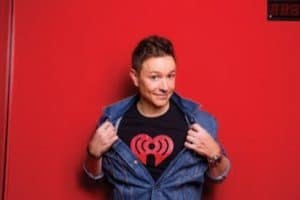 (KNCO was one of Rush’s very first affiliates). Then I was the board op and host of the noon and evening news blocks, with the local anchors and Paul Harvey segments. And each night I got to host a one-hour show as a DJ on the Country station at 7 o’clock.
(KNCO was one of Rush’s very first affiliates). Then I was the board op and host of the noon and evening news blocks, with the local anchors and Paul Harvey segments. And each night I got to host a one-hour show as a DJ on the Country station at 7 o’clock.
RI: What was all that like for a kid that age?
Davis: I certainly didn’t have any real experience. I didn’t know how to write news copy or be a radio DJ, except for doing my best impersonation of what I’d heard on the radio all my life. But I sure wasn’t shy about raising my hand and offering to help! The key for me was, and I tell this to new people too, you’ve got to pester people. Be there in the building as much as you can. Constantly try to get involved in everything. Can I sit in on that client meeting? Can I run the board for that remote? Can I listen in on that conference call with the research team? Eventually, I wore people down and they finally let me help. And that’s how I learned.
Looking back at my early years as a 21- or 22-year-old kid, it’s amazing the high-level meetings I was allowed to sit in on. I always say the best way my bosses “paid” me wasn’t the paycheck I got every two weeks. The real prize was the card key that got me into the building — and I took great advantage of that, and I was there constantly.
RI: How did you wind up as an intern at WASH?
Davis: When I got back to DC, I sent airchecks of what I thought was my “wonderful” KNCO on-air work to all the big stations in Washington, looking for weekend DJ slots. They of course didn’t call because, in hindsight, I think my aircheck was pretty mediocre, especially for a market that big. But one day when I was napping in my dorm, I got a call from WASH saying they’d received my application to be an intern. Now I never sent them an application to be an intern — I think my aircheck tape was probably so bad they just tossed it in the intern bin. But it worked out! And I started in September of ’92 as the morning show intern.
So when my friends from school were out partying all night, I was catching the Metro bus out on Pennsylvania Avenue at 2:30 every morning to head up to the WASH studio for work. And within a couple of months, they started paying me. The longtime morning man, David Burd, who was always so supportive, pulled me into the GM’s office, and they said they’d cobbled together a great job for me. I was going be the morning show producer, and the van driver, and the programming helper, and they were going to pay me $17,300 a year. And I said, “I’ll take it!” So from that point on, all through my sophomore, junior, and senior years at GW, I was working full-time and then some at WASH.
RI: How long were you at WASH?
Davis: For a year or two, I was the morning show producer. I added full-time on-air duties Monday through Friday, midnight to 5, and I was the assistant PD. I had to squeeze in my college work where I could. I’d be writing my GW term papers overnight while I was playing Elton John and Gloria Estefan songs on WASH. I was typing them on the old AP computer terminal, and printing them at the end of my airshift on the giant dot matrix printer that WASH shared with WTOP. And I can tell you I got lots of dirty looks from the WTOP news anchors who were trying to print their scripts for the 5 a.m. newscast, and I had the printer clogged up with my college papers.
In 1997 I became the PD of WASH. I was 24, so at that point I think I was the youngest major-market PD. After I’d been PD of WASH for about a year, they added a second station and gave me the WGAY PD stripes too. So I had both the mainstream AC and the Easy Listening station.
RI: Where did you wind up after DC?
Davis: That was actually an important moment. In 1999, our company had a PD opening at WLIT in Chicago, and I of course waved my hand and said, “I want to go there!” like any eager young pup would do. And they told me I wasn’t ready for Chicago. So I pouted and stomped my feet, and I called Bill Figenshu at CBS and accepted the first job he had, which was programming in Houston.
Looking back, it’s a darned good thing I wasn’t allowed to go to Chicago in 1999, because they were right — I wasn’t good enough for that yet. And I probably would’ve fouled it up, and I might not be in the business anymore today. I certainly don’t think I’d be where I am today as the president at iHeartRadio.
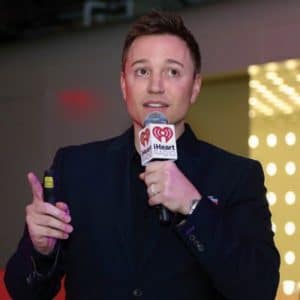 RI: How did you wind up back at Clear Channel?
RI: How did you wind up back at Clear Channel?
Davis: In 2002 I came back as the RVPP for Clear Channel based in Detroit, overseeing all the Michigan stations. And I was the day-to-day programmer at WNIC. That’s the main reason they hired me, to focus on pumping WNIC back up. It was such a huge AC station for decades, but it was struggling after the heritage morning show host, Jim Harper, went across the street to Greater Media. They launched a new AC station around Jim and designed it to emulate the great heritage sound WNIC had always had. So WNIC got Chuck Gaidica, who was the most beloved TV personality in Detroit. Chuck was the lead meteorologist for the NBC affiliate, and he made a great leader for the new WNIC team.
That time at WNIC was one of the most fun times for me. Such a wonderful crew of people. And it was so rewarding to help them build WNIC back to being number one in Detroit. As a student of this business, I hate seeing big heritage brands fall into disrepair. I like big institutions to stay big. So it was a blast to help turn one around.
RI: What’s it like being in charge of 30 radio stations, and programming one in particular? How do you succeed at that?
Davis: You make sure you have great folks on the teams, and you make it fun. It’s the entertainment business, after all. We can’t let it be too serious. As hard as you have to work to be successful in this world, you’ve got to find ways to inject a lot of happiness and fun. If you’ve been in radio a long time, you remember how every station used to have a dedicated PD and a dedicated GM and a dedicated sales manager. And then, over time, leaders ran a couple of stations. And then maybe a handful of stations.
So it can be easy sometimes to feel like we’re having to “do too much” now. But stop and think about how lucky we are. If you grabbed any stranger off the street and told him, “Hey, I want you to program five radio stations,” do you think he’d say “Five? No way! That’s too many!” No, he’d clap his hands and jump for joy, and that would be the most exciting day of his entire career. I try to stay focused on how great our business is, so no matter how much I oversee, it never feels like too much.
RI: So you went from Detroit to Chicago for Clear Channel.
Davis: I loved Detroit and those people, and it was a fun place. But when I got the call from Clear Channel in Chicago in 2005, I couldn’t turn that down. Chicago was always a market I wanted to be in. I was the RVPP for the Chicago region, and I was the day-to-day PD at WLIT and WNUA. And that was amazing for me because those are two stations I had targeted when I was very young as stations I’d love to work for someday. WLIT was always a huge AC powerhouse, and WNUA was the best Smooth Jazz station there ever was. And Chicago is a favorite city for me. I had a much better time and more success there than I would have had if I’d gone there back in 1999, when I first tried to go.
By 2008 I became a senior VP of programming, overseeing 25 markets and about 125 stations. I traveled four days a week, and O’Hare became like a home away from home.
And after we invented our in-house syndication product, Premium Choice, which was really a collaboration by all the senior programmers in the company, I raised my hand and said I wanted to oversee PC full-time. I loved what we’d built — a way for our best programmers to help more stations. A way for our best talent to be heard on more stations. A way for our best imagers to have their creative work touch more stations. So I ran Premium Choice from 2010 to 2012.
RI: You said you got the call in 2012 to go to New York. What did that mean?
Davis: They were creating the new National Programming group under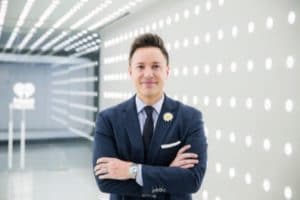 Tom Poleman, and Tom called and invited me to New York to be his EVP and GM for the national team. So our team worked with all the regional SVPPs on the programming of all 850 stations, and managed research and marketing and events.
Tom Poleman, and Tom called and invited me to New York to be his EVP and GM for the national team. So our team worked with all the regional SVPPs on the programming of all 850 stations, and managed research and marketing and events.
RI: Radio can be a business that changes a lot. How do you make sure you stay on somebody else’s radar when there’s constant change at the top of a company?
Davis: Be curious. Talk to everyone. Ask about all parts of the business. Talk to competitors. And don’t just reach out to people when you need something — that’s not a good way to be successful in business, and it’s frankly not the way to be a very nice person. Be kind to all people, all the time.
And when it comes to your career growth, let people know what you want. They can’t and generally won’t guess. Bosses can’t intuit what your career goals are. So you’ve got to let them know what you want to do in the future. I told John Hogan in 2007 that my dream was to become one of his SVPPs. I told him I wanted to be at the top of his list next time he had an opening. And I told him if I wasn’t already at the top of that list, I wanted to hear what I needed to fix. And that gave us the opportunity to talk about what I was great at and what areas needed work, so by 2008 I got that call to become an SVPP for Clear Channel.
RI: Who have been some of your mentors along the way?
Davis: Since I grew up through the programming ranks, I always think about a handful of programmers in particular that helped me over the years. Guy Zapoleon was my first consultant when I was at WASH. Guy’s seen more research and worked with more radio brands than anyone I can think of. So much knowledge. And genuinely one of the sweetest people.
There were several PDs at WASH during the first years I was there, and Steve Streit was the third PD I worked for at WASH. He really shaped the station into a different kind of AC station — lots of fun, big contests, CHR-style imaging. I learned a lot from Steve.
As the lead AC programmer for Clear Channel, Jim Ryan was always very supportive and involved me in a lot of fun projects all over the country and taught me a lot.
Steve Rivers was amazing — I got to work closely with Steve both in DC and in Houston. He was obviously one of the very best ever at crafting a creative product that could reach out and grab listeners. And of course, having a world-class programmer like Tom Poleman right down the hall every day is always a good thing. I’m always picking Tom’s brain. I’ve known Tom for 20 years now, and he’s great.
RI: And you are trying to mentor others as they come through the business?
Davis: Totally. Even though I’m not that old, I sort of feel like a dad or the elder statesman around here. I like people to have as much fun as I’m having. It hurts my feelings if I ever hear about people not enjoying working at iHeart or not having a good experience in radio. So I’m always trying to coach people and help people get to where they want to be.
RI: What is the key to mentoring an on-air talent to greatness?
Davis: I would tell air talent and programmers the same thing: Don’t let PPM scare the creativity out of you. Don’t over-sanitize your products. We can’t win a battle by trying to be a music jukebox. Digital music products will always have fewer (or no) interruptions. So we need our stations to be unique and interesting and quirky. That’s what makes people entertaining, and that’s what makes a radio station entertaining.
RI: So you mentioned Jim Harper and what happened at Greater Media. And in L.A. there was a similar situation with Big Boy, and launching a format around him, on KRRL-FM. That’s a major programming situation, no matter what market or company it’s with. Take us behind the scenes. What goes into something like that, when you’re ready to launch something that big and that bold?
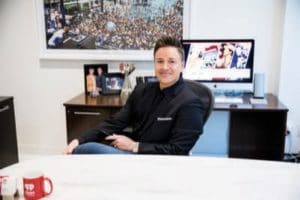 Davis: We want winning brands. And we’re not afraid to try things, even if they’re risky. We don’t always get it right, but that’s fine — we learn and adjust quickly. In Los Angeles, we had a station that was performing OK but wasn’t a huge winner. So when a personality like Big Boy was available, it was a perfect chance for us to try something new. Bob [Pittman] is a huge champion of trying new things. And he always challenges all of us to not be afraid of making mistakes. The most important thing is to try new things.
Davis: We want winning brands. And we’re not afraid to try things, even if they’re risky. We don’t always get it right, but that’s fine — we learn and adjust quickly. In Los Angeles, we had a station that was performing OK but wasn’t a huge winner. So when a personality like Big Boy was available, it was a perfect chance for us to try something new. Bob [Pittman] is a huge champion of trying new things. And he always challenges all of us to not be afraid of making mistakes. The most important thing is to try new things.
RI: Does radio play too many commercials? Are you worried about that?
Davis: No. People love radio because it connects them to their community. It helps them stay plugged in. And really, commercials are part of how listeners learn what’s going on. The new movie to see. The new restaurant to try. The new music to check out. The new car that everyone’s talking about.
RI: On a terrestrial station, on a music station, is there a right number?
Davis: Every station is unique, and you’ve got to look at the full landscape of that station, the full tapestry of content, before you can hone in on the “right” amount of commercials.
RI: Turning to digital, should radio worry about Pandora and Spotify and the other streaming products out there?
Davis: Our brands need to be available everywhere. We’ve grown iHeart’s broadcast ratings 10 percent in the past year and simultaneously grown our digital listening 30 percent. We’ve made it so darned easy for people to enjoy our stations, they’re coming to us more and more.
Think of it this way: About a third of our broadcast listeners will at some time or another listen to that station digitally. Our iHeartRadio app is really a “safety net” to catch all those extra listening occasions. If we didn’t have iHeartRadio, our listeners might go to other digital services — and over time, that’d start to eat into the core habit of enjoying our broadcast radio brands. So I think iHeartRadio is a vital part of the future health and success of our stations.
RI: How important is it for Nielsen to get digital ratings out and in the hands of advertisers?
Davis: Very important. Whether it’s Nielsen or someone else, we need all the listening captured and measured. Consumers don’t differentiate between hearing Z100 on their car radio versus hearing Z100 on their clock radio versus hearing Z100 on their smartphone. It’s all just “Z100” to them. And we need to think about tallying all the listening the right way.
RI: The car radio is constantly changing. Is iHeart ready for the changes?
Davis: Absolutely. We’ve got the iHeartRadio app integrated with over 90 automakers and consumer devices. So even though consumers overwhelmingly — like 91 percent, as I recall — say they like the easy-to-use AM/FM car radio just the way it is, with physical buttons and knobs, and they do not want radio to become just another app in a confusing dashboard — for those who want to experience radio through an app, we’ve got iHeartRadio in the dashboard when they want it.
RI: How did you get involved on the digital side at iHeart?
Davis: I’d been made the president of the company’s Networks group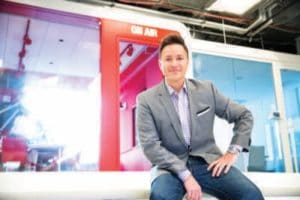 — including Premiere, TTWN, 24/7 News Network, and several other businesses inside iHeartMedia. And then, in the summer of 2014, we were three years into the iHeartRadio app; it was so successful. Brian Lakamp was transitioning into a new technology role for the company, and Bob and [President/COO/CFO] Rich [Bressler] decided to give me a shot leading the digital team.
— including Premiere, TTWN, 24/7 News Network, and several other businesses inside iHeartMedia. And then, in the summer of 2014, we were three years into the iHeartRadio app; it was so successful. Brian Lakamp was transitioning into a new technology role for the company, and Bob and [President/COO/CFO] Rich [Bressler] decided to give me a shot leading the digital team.
Remember, the core mission of iHeartRadio is to be an extension for our broadcast radio brands. So I think it made some sense to try infusing the digital operation with some more radio DNA. And I think we’ve built the perfect mix of people now. Some of the brightest digital minds in New York City and around the country — and several of us who grew up in radio — to bring that different expertise to the table.
The last two years have been probably the most rewarding I’ve ever had. Because I’m so passionate about this business, and I know that these great stations have to be available anywhere listeners want them. So iHeartRadio is a key piece for keeping our brands big and popular for many, many years to come. It makes me feel great to be part of that in some small way.
RI: You got into this business as an intern, in charge of nobody. How many people are you now in charge of at iHeartMedia? What is your day like?
Davis: Almost 2,000 people are part of the Networks group overall. But I’ve got great partners who help me manage these businesses. What do I do all day? I usually tell people my job is to solve problems. I help our advertising partners solve their challenges, trying to reach consumers. I help our own products solve the challenges of connecting with listeners. I help our internal staff and empower them and bring a structure that lets them really be all they can be. I touch a lot of things every day and try to make things a bit better.
I look back, and I think I was a solid programmer in my day, but I always saw myself mainly as a businessperson, with a curiosity about all parts of the media business. So it’s really allowed me to shift from one exciting role to the next — across many different parts of our company.
RI: You made a big announcement this fall about iHeartRadio’s new subscription services. How important is that to the company, to be competitive in that space?
Davis: I’m so excited about it! Remember, we created iHeartRadio five years ago to help our powerful broadcast brands continue to be strong for years to come, a way for listeners to keep loving our radio stations. And this new technology turbocharges that! Because we’re making the radio listening experience even more engaging and more interactive. We’re really reinventing live radio — with our new on-demand subscription services, built right into the iHeartRadio app.
It’s the first time ever that on-demand functionality is being used to improve the radio experience, so we’re the first digital music service to bring on-demand functionality to the mass market — in an easy-to-use way. Our service is designed to bridge the divide between music discovery and music collecting. To fix that broken experience when you hear a song on radio, and you scribble down the name of the song, and you maybe remember to buy the song later. That’s a clunky experience. So for the first time ever, when listeners hear a new song or a favorite song on the radio, they’ll be able to instantly replay a song and even save it directly to a playlist. And there’ll also be offline listening and unlimited skips in custom radio stations.
Eighty-four percent of iHeartRadio users don’t subscribe to any music service. Why is that?
Davis: Surely everyone would like to be able to listen to any song they want to any time. But we know from research that existing services are too complicated and hard to use. Spotify essentially is a digitized version of a stack of LPs, or a pile of CDs. Not easy to search through and find what you want. It was built for tech-savvy users, or heavy music users — a product for early adopters.
We are solving the problem once and for all, bringing easy on-demand features to the mass market — attached right to their comfortable radio listening experience. We’ll launch iHeartRadio Plus and iHeartRadio All Access — coming in January.
RI: Why do you think you’ll win the battle with all the others?
Davis: Because radio is powerful, and no one has a bigger megaphone than we do: 269 million Americans hear our broadcast stations each month. That’s how we built iHeartRadio to 84 percent brand awareness and over 90 million registered users: We just talked about it on the radio. And that’s how we’ll promote the new subscription service, too. Pandora has to spend hundreds of millions of dollars a year buying advertising from other companies. We can reach nearly everyone in America using just our own stations.
RI: You’ve risen quickly at the biggest company in the radio industry. Are you the future of iHeartMedia?
Davis: I don’t know exactly what’s next for me, but here’s what I do know: I know that iHeartMedia has a really exciting future ahead. And I know that I’d love to be here for a long time to be part of the fun and part of the success. It’d be fun to be talking to you in the year 2022, talking about how I made it 30 years and how I’m still going strong and still having fun. Sounds like a plan to me!

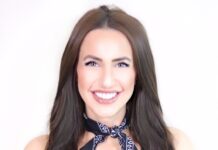
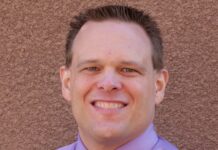

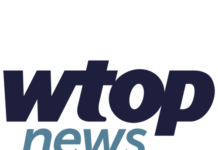

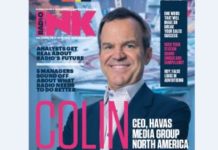


Talk about in denial. This guy SERIOUSLY can say that he doesn’t think that radio plays too many commercials ??!!! Has he looked at a major market PPM station file ever??? The PPM files show clearly, that when any station starts a cluster break of 6, 8, 10 or more commercials in a row, that over 50% of the audience tunes out of the station by the time the second commercial is running. And, millenials #1 reason for not listening to terrestrial radio is too many commercials. Davis is only correct in his statement that radio doesn’t play too many commercials if he’s talking about the short-term billing gains for the stations. But if he’s talking about advertisers receiving the full audience for their commercials- which they’re being charged for – or if he’s talking about radio retaining and growing it’s audience, then he’s dead wrong. But of course he needs to spout the company line anyway. …No one questioned the Captain of the Titanic.